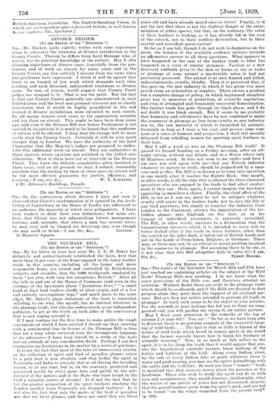DIVORCE REFORM.
[To THE EDITOR OF THE " SPECTATOR."]
Sia,—Mr. Barker, quite rightly, writes with some experience when he advocates the extension of divorce jurisdiction to the County Courts. Therein he differs from Lord Heneage who, of course, has no practical knowledge of the subject. May I, also claiming experience of divorce cases (especially from the pro- vinces), and of work on circuit for many years and in the County Courts, say how entirely I dissent from the views these two gentlemen have expressed. I think it will be agreed that there is no branch of law work which demands such close scrutiny and such detached, independent treatment as divorce cases. No one, of course, would suggest that County Court judges are unequal to it. That is not the point. But the fact is that our County Courts generally are administered in such limited areas and the local and personal interests are so closely interwoven that it would be highly prejudicial to the end desired if divorce jurisdiction were extended to such courts. By all means remove such cases to the appropriate counties and try them on circuit. This ought to have been done years ago, and even if the Divorce Bill now before Parliament is not arricd in its entirety it is much to be hoped that this modicum of reform will be effected. I deny that the change will be more costly than the County Court. Certainly it will be very much cheaper than in London. We have the authority of the Lord Chancellor that His Majesty's judges are prepared to under- Like this additional work on circuit. They are authorities in these matters whose opinions are entitleed to the fullest con- sideration. Most of them have sat at intervals in the Divorce Court. They know the delicate complexities often involved in these cases; and on all grounds we may, I submit, reasonably conclude that the tending by them of these eases on circuit will be the most effective guarantee for justice, efficiency, and economy.—I am, sir, &c., W. T. LAWRANCE. 3 Dr. Johnson's Buildings, Temple.


































 Previous page
Previous page